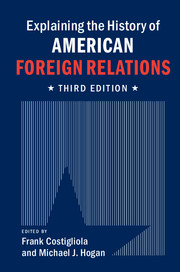Book contents
- Frontmatter
- Dedication
- Contents
- List of figures
- List of contributors
- Introduction
- 1 Theories of International Relations
- 2 National security
- 3 Corporatism: from the new era to the age of development
- 4 Explaining political economy
- 5 Diplomatic history after the big bang: using computational methods to explore the infinite archive
- 6 Development and technopolitics
- 7 Nonstate actors
- 8 Legal history as foreign relations history
- 9 Domestic politics
- 10 The global frontier: comparative history and the frontier-borderlands approach
- 11 Considering borders
- 12 The privilege of acting upon others: the middle eastern exception to anti-exceptionalist histories of the US and the world
- 13 Nationalism as an umbrella ideology
- 14 Nation Branding
- 15 Shades of sovereignty: racialized power, the United States and the world
- 16 Gendering American foreign relations
- 17 The religious turn in diplomatic history
- 18 Memory and the study of US foreign relations
- 19 The senses
- 20 Psychology
- 21 Reading for emotion
- Index
18 - Memory and the study of US foreign relations
Published online by Cambridge University Press: 05 March 2016
- Frontmatter
- Dedication
- Contents
- List of figures
- List of contributors
- Introduction
- 1 Theories of International Relations
- 2 National security
- 3 Corporatism: from the new era to the age of development
- 4 Explaining political economy
- 5 Diplomatic history after the big bang: using computational methods to explore the infinite archive
- 6 Development and technopolitics
- 7 Nonstate actors
- 8 Legal history as foreign relations history
- 9 Domestic politics
- 10 The global frontier: comparative history and the frontier-borderlands approach
- 11 Considering borders
- 12 The privilege of acting upon others: the middle eastern exception to anti-exceptionalist histories of the US and the world
- 13 Nationalism as an umbrella ideology
- 14 Nation Branding
- 15 Shades of sovereignty: racialized power, the United States and the world
- 16 Gendering American foreign relations
- 17 The religious turn in diplomatic history
- 18 Memory and the study of US foreign relations
- 19 The senses
- 20 Psychology
- 21 Reading for emotion
- Index
Summary
Memory is not reclaimed. It is produced.
Barbara Kirshenblatt-GimblettHistory is the fruit of power. But power itself is never so transparent that its analysis becomes superfluous. The ultimate mark of power may be its invisibility; the ultimate challenge, the exposure of its roots.
Michel-Rolph Trouillot, Silencing the Past: Power and the Production of HistoryMichel-Rolph Trouillot begins his brilliant analysis of the silences embedded in history in general and the particular erasure of the Haitian Revolution from Western historiography with a tale about how a political act of memory rewrote history. When on March 6, 1836, the Mexican forces led by General Antonio López de Santa Anna broke through the mission turned fort nicknamed “the Alamo,” he appeared victorious. But Trouillot argues, when Santa Anna fell prisoner to Sam Houston a week later at San Jacinto, he was doubly defeated. “He lost the battle of the day; but he also lost the battle he had won at the Alamo.” When Houston's men punctuated their attacks with shouts of “Remember the Alamo,” explains Trouillot, “they doubly made history. As actors, they defeated Santa Anna and neutralized his forces. As narrators, they gave the Alamo story a new meaning.” For Trouillot, the inherent ambiguity in the word history entails a slippage between actors and narrators and between agents, actors, and subjects.
Trouillot's account of the Alamo illuminates an insight at the heart of memory studies: history is never unmediated; it is produced. Shifts in meaning-making and perceptions in the present can turn the past as on a pivot, with the ground giving way in what historians call the unstable past, or the unpredictability of the past. The memory of the Alamo, transmuted into an icon for the Republic of Texas, was absorbed into the national identity of the United States. By annexing Texas and going to war with Mexico, the United States forever altered relations with its southern neighbor. And as Trouillot's analysis demonstrates, the inability of Westerners to imagine even the possibility of Africans acting politically distorts Western perceptions of the Haitian Revolution, resulting in similarly momentous foreign policy consequences for the United States and the world.
Among scholars of US foreign relations, Emily Rosenberg has made important interventions in the debates ensuing from the proliferation of memory studies and the often-politicized entanglements in culture wars.
- Type
- Chapter
- Information
- Explaining the History of American Foreign Relations , pp. 304 - 316Publisher: Cambridge University PressPrint publication year: 2016
- 12
- Cited by



